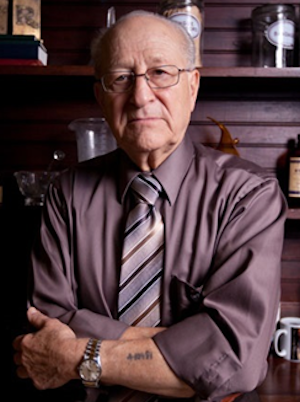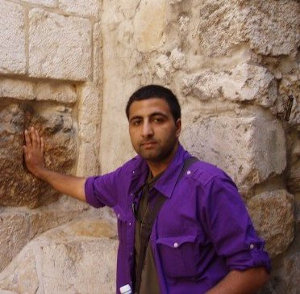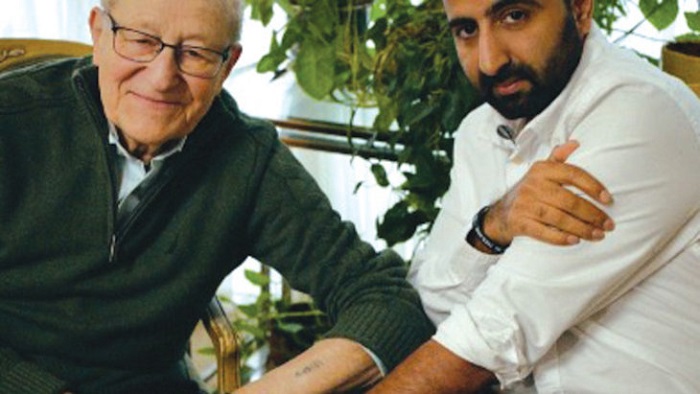The two men stretch out their left forearms – one white, one brown, both bearing the number A10491.
The former belongs to Irving Roth, 91, a Jew who was born in a small Slovakian village, experienced the flames of hatred in Europe as a teen-ager and survived the Auschwitz and Buchenwald death camps in Poland and Germany.
The latter belongs to Kasim Hafeez, 36, a former Muslim jihadist of Pakistani heritage who left behind his extremist beliefs and native Britain to become a Christian, live in America and support Israel. He had Roth’s Auschwitz number tattooed on his arm in an act of solidarity.
They are unlikely friends, these two. Their outstretched arms in a publicity shot for a new documentary prove the point. Roth and Hafeez weave together their stories in “Never Again,” a look at historical and current anti-Semitism. Christians United for Israel produced the film that was released in theaters across the United States last week.
It all started when they met at CUFI events, both speaking on the dangers of prejudice and propaganda.
“It was instant love for the ideas and what we were trying to do,” Roth told Aish.com.
“Irving is just an awesome human being,” Hafeez agreed. “The horrors he suffered are unimaginable to me. He’s lived a full life and has so much joy about him. He has so much energy, but at the same time, he carries that burden of the past.”
Their lives could not be more different.
The Handwriting on the Wall
Roth grew up in Hummene, Slovakia, where 7,000 Protestants, Catholics and Jews lived in relative harmony. He had friends of all religions. Then on the first day of sixth grade in September 1940, he read a sign outside the gates of his schoolyard that declared, “No Jews or dogs allowed.”
The Holocaust began with a series of laws against the Jews. They were no longer allowed to go to school, the park or the beach. They couldn’t wear or own any article of clothing made from skins or furs. Roth had to deliver his sheepskin coat to the police department.

Economic panic fanned the flames. Soon Jews were not allowed to own a business. Because of the new laws, Roth’s father, Joseph, invited a gentile friend into his lumber firm so it would appear to be a Christian business. The friend betrayed their agreement, demanding half the profits and taking over the business.
In 1943 the Roths fled to Hungary. They had relatives in a small village with whom Irving, his brother and grandparents stayed. Joseph and his wife went on to Budapest so he could work as an accountant. However, Joseph fell ill and ended up in the hospital. A righteous gentile nurse took in the couple and hid them in her one-bedroom apartment for several months.
Meanwhile, the Nazis forced Irving, his brother and grandparents onto one of the first transports to Auschwitz. Their arrival after three days and nights in a cattle car was traumatic.
“In the distance I see flames. That kind of scared me. We’re standing on the platform next to the cattle car. As the line moved, I was separated from my grandparents. They were marched off to the buildings with the chimneys and flames. They were told they were going to take a shower after which they were going to get a warm meal. Of course they didn’t tell them they were going to the gas chamber to be murdered.”
Toward the end of World War II, Roth and his brother were part of a forced march from Auschwitz to Buchenwald in January 1945. About a month later his brother was in a “selection,” in which the Nazis determined whom to kill and whom to keep alive for slave labor, and taken to the Bergen-Belsen concentration camp, where he was murdered.
How a Righteous Gentile Saved a World
“In Buchenwald there was even less food than in Auschwitz,” said Roth. “It was so overcrowded that if you got a boiled potato every second day or a bowl of soup, you were lucky.”
He weighed 75 pounds when American forces liberated Buchenwald April 11, 1945. However, he counts himself lucky. “I was one of the few fortunate young people whose parents survived the oppression because of being hidden by a righteous gentile.”
The Roths made their way to the United States, where Irving was drafted into the Army, earned a degree in electrical engineering from the former Polytechnic Institute of Brooklyn, and worked as an engineer for Unisys for 33 years. He married and had a family.
Since retiring as director of research for Unisys in 1994, he has served as director of the Holocaust Resource Center–Temple Judea of Manhasset and authored and edited books about the Holocaust and the evils of prejudice.
Confessions of a Former Terrorist
Hafeez addresses prejudice from the other side. Born in Nottingham in England’s East Midlands, home to a large population of Muslim immigrants, he learned the Koran and grew up on a diet of anti-Semitic and anti-West messages.
“I hated America. The Jews were the reason for all the evil in the world.”
He admitted, “I hated America. The Jews were the reason for all the evil in the world.”
America personified the West. He believed it to be controlled by Jews, whom Israel personified.

A feeling of being an outsider in the United Kingdom – even though he was born there – made it easier to embrace the ideology. “You’re feeling that you don’t belong. You’re looking for identity, and these extremist groups use that. So Islam is the constant you can lean on. You’re not British, you’re not Pakistani, you’re Muslim first, that’s all that matters. It was us versus them.”
In short, Hafeez said, “When you think you’re a victim you allow yourself to justify things you wouldn’t normally justify.”
At his most radical point, he planned to go to Pakistan and connect with a terrorist group. But first he wanted to gain knowledge about his enemy. He obtained a copy of the 2003 book “The Case for Israel,” by Harvard University law professor Alan Dershowitz.
“I thought it was complete rubbish, but decided to buy the book so I could prove this was wrong,” Hafeez said in an interview from his home in Florida. “As I started reading it, it raised questions I’d never raised. When you believe something to the point of wanting to kill others, you don’t read one book and say, ‘Oh okay, I was wrong.’ ”
His curiosity piqued, he started reading more books on the Middle East. In 2007 he decided to go to Israel and see the reality. Security officers at Ben Gurion Airport questioned him for eight hours before admitting him into the country.
“The change began when I spoke to ordinary people – Christians, Jews, actual Israelis. It’s hard to hold on to your own bigoted beliefs when you are confronted with the truth.”
After his trip he went back to Britain and told people about his experience. Family and friends responded with hostility. From personal experience he knows, “When you embrace weak or flawed ideas you’re hesitant to have them questioned.”
Today, Hafeez works as a Middle East analyst for CUFI. He is a speaker, writer, and pro-Israel activist. He made a new beginning for himself in Canada in 2013 and lived there several years before moving south.
On the speaking circuit he talks about the need to make a choice and do what is right – for instance, condemning attacks on synagogues.
Hafeez knows the power words and symbols play in creating propaganda to distort people’s beliefs and impel them to action. He speaks on college campuses and encounters students who see graphic images that are presented as “evidence” of human rights violations – when in fact the perpetrators may be Hamas oppressing its own people.
He and Roth aim to educate their audiences how to filter information to determine the source, the bias and the intention behind it.
Evil Begins with Words
“One of the messages we want people to understand is that all evil begins in words,” says Roth, invoking what he calls “the most evil event in human history whose objective, the complete annihilation of the Jews of Europe, was based on pure lies.”
He has spoken to perhaps a half-million people on the Holocaust through a variety of organizations, schools and colleges, churches and synagogues. “What drives me is I was a victim, along with 10 to 11 million other Jews of Europe, of this type of demonization, and can see the signposts along the road from democracy to mass murder. I want to make sure my great-grandchildren can live in freedom.”
How will students in the mid-21st century know what happened in the Holocaust? Roth talks about the need for surrogate eyewitnesses after the Holocaust survivors pass on.
I want to ensure that what happened to Irving will never happen to his children, grandchildren and great-grandchildren. That’s why he gave Hafeez permission to tattoo his Auschwitz number A10491 on the younger man’s arm. The unlikely duo are partners in teaching how a democracy can become a dictatorship, and God-fearing people can become murderers. They want to help prevent both.
“This is one of the most important challenges I’m going to be involved in,” added Hafeez. "I want to ensure that what happened to Irving will never happen to his children, grandchildren and great-grandchildren.
“I want to speak out because when you have the level of hatred I had, it poisons you and the world. If I could stop anyone from going down that path, I would.”
For more information on “Never Again?” visit https://www.neveragainthemovie.com/
[Published on Aish.com, October 25, 2020]

